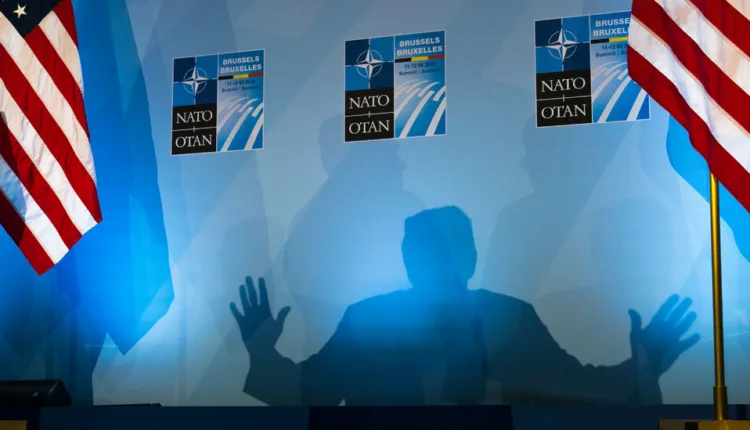
Trump’s NATO Stance Indicates Broader Change in America’s Global Position
TL/DR –
At a campaign rally, former President Donald Trump asserted that he would encourage Russia to attack NATO allies who failed to meet their financial commitments, a statement that met with shock globally. This statement typifies a shift in American attitudes towards international alliances, with a significant portion of the public viewing such alliances as outdated burdens. This shift in attitude is seen as part of a longer-term trend towards nationalism and away from broad-coalition internationalism, which has been exacerbated by Trump’s statements and actions, and is visible in both left and right political spheres.
Trump’s NATO Stance Alarms Global Community
Former President Donald Trump’s recent call to encourage Russia to attack NATO allies if they fail to pay, met with shock globally, while met with cheers from his South Carolina supporters. This response underlines the shift in U.S. leadership perception worldwide, with many seeing Cold War-era alliances as outdated burdens.
Popular opinion, however, remains divided. While some decry the diminishing of international engagement, others believe in a recalibration of U.S. priorities for a new era. Michael Beckley, a scholar at Tufts University, suggests that this debate between go-it-alone nationalism and broad-coalition internationalism has deep historical roots.
Recent Developments & Reactions
Recent developments, such as Trump’s promise to end foreign aid without repayment, and his denial of a $95 billion security aid package for Ukraine, Israel, and Taiwan, have intensified this debate. Allies watching the situation closely include those attending the upcoming Munich Security Conference.
National Security Adviser Jake Sullivan expressed concern over this shift, stating that disregarding alliances and failing to stand up to dictators could have severe consequences for U.S. national security and NATO allies.
Trump’s Long-standing View on Alliances
Trump’s views on alliances are no recent phenomenon. His conviction that the U.S. has been exploited by allies on trade, immigration, and security goes back to the 1980s. He has pushed the debate away from international engagements, favoring free trade agreements and expanding them globally. His administration has also advocated for a reconsideration of NATO’s collective defense and broader alliances.
Previous presidents including Bill Clinton, George W. Bush, Barack Obama and even committed internationalist Joe Biden have also advocated for a greater domestic focus after perceived overattention to foreign affairs.
Increasing Division
Trump’s hostility towards alliances and international accords is unprecedented. His attempts to pull out of NATO, Paris climate accord, Iran nuclear agreement and the Trans-Pacific Partnership free trade agreement, highlight a growing discontent with alliances, found on both the left and the right.
As per the Chicago Council on Global Affairs, a partisan divide on alliances has widened during Trump’s era. While Democrats largely support alliances, Republicans do not. Despite this, Trump’s nationalist vision, encapsulated in his “America First” slogan, resonates with a significant section of the public.
The Importance of Alliances
Heather A. Conley of the German Marshall Fund of the United States believes that the American public sees only the trade-offs of alliances, not their value. She argues that a global-alliance architecture is a strength for the U.S., especially when anti-American forces are aligning. However, this needs clear explanation and understanding of the benefits.
—
Read More US Political News
